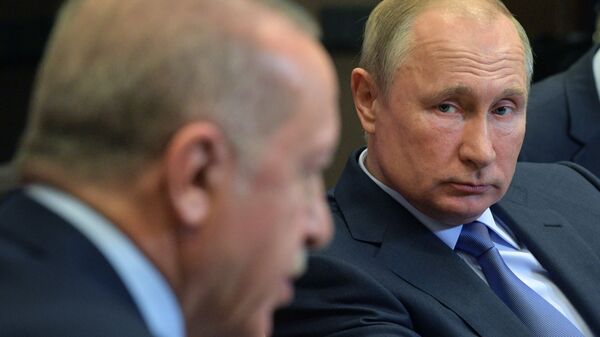Turkish President Recep Tayyip Erdogan has said that he asked Russian President Vladimir Putin to leave Ankara "face to face" with Syrian authorities in the conflict over Idlib during Friday's talks.
"I asked Mr. Putin: 'What's your business there? If you establish a base, do so but get out of our way and leave us face to face with the regime," Erdogan said, speaking to reporters in Istanbul, his comments cited by AFP.
Erdogan also warned that the "Syrian regime" would "pay the price" for the deaths of Turkish troops in Idlib, and said that if Russia left Damascus one-on-one with Turkey, "we will do what is necessary."
Erdogan confirmed that Turkey had opened its borders with the European Union for Syrian refugees, and that some 18,000 migrants had already crossed the border into the EU. According to the Turkish president, Ankara could not "handle a new refugee wave" from Syria. Earlier, Turkish officials told media that Ankara had opened its borders with the European bloc amid the escalating conflict in Idlib.
"We have been saying for a long time that we are not obligated to accept such a number of refugees. You promised us assistance, but are doing nothing, so we opened our borders yesterday. 18,000 refugees have already passed through, and today this number will be 25,000-30,000, and we will not close our doors because the EU must keep its word," Erdogan said, presumably referring to the March 2016 Turkey-EU migrant deal.
Putin and Erdogan spoke by telephone amid tensions in Idlib, the restive Syrian province where tens of thousands of militants remain concentrated, and where dozens of Syrian and Turkish troops have now been killed amid weeks of clashes.
Also on Saturday, the Russian Foreign Ministry reported that the recent talks with Turkey had led to the consideration of "concrete steps" aimed at achieving "lasting stability in the Idlib de-escalation zone."
"Both sides confirmed their goal to reduce tensions on the ground while continuing the fight against terrorists," the Ministry said in a statement.
Earlier, in an emergency meeting of the UN Security Council on the situation in Idlib on Friday, Russian Ambassador to the UN Vasily Nebenzya emphasized that the Syrian Army had every right to eliminate terrorists in Idlib and anywhere else on its sovereign territory.
"In recent months, the terrorists who captured Idlib, mainly from [al-Nusra*] had dramatically increased attacks against civilians in neighbouring settlements and the Syrian military. In response to the constant violations of the ceasefire inside the Idlib de-escalation zone, the Syrian Army of course has every right to respond and to squash the terrorists," Nebenzya said.
The Russian diplomat stressed that Russia could not restrict Syria from fulfilling the requirements on fighting terrorism set out in the Security Council's own resolutions, especially since Damascus was doing so on its own territory. He added that he hoped that a return to the Astana agreements could help prevent a repetition of the series of events which led to the deaths of Turkish and Syrian troops.
For his part, Syrian Ambassador to the UN Bashar al-Jaafari accused Turkey of aggression in Syria, and alleged that Ankara was using its Idlib observation posts to provide support for terrorists. The diplomat stressed that Syria would do everything necessary to protect its citizens and defend its sovereignty and territorial integrity.
Idlib Crisis Deepens
Simmering tensions in the Idlib de-escalation zone were ramped up again on Thursday, when Nusra terrorists initiated a large-scale attack on Syrian Army positions. Syrian troops returned fire, with at least 33 Turkish troops killed in response. On Friday, the Russian millitary said the Turkish forces caught in the crossfire should not have been there in the first place. Turkish media later reported that the Turkish army had destroyed some 130 pieces of Syrian military hardware in recent weeks.
On Friday, Greek media reported that Athens had vetoed a planned NATO statement expressing solidarity with Ankara over the deaths of the Turkish troops. Greece reportedly made the decision despite opposition from the US, the UK, France and Germany.
Russia has repeatedly accused Turkey of proving unable to fulfill several key obligations related to the Idlib de-escalation zone, including the requirement to separate armed militants ready for peace talks with Damascus from jihadists.
The Syrian Army began an offensive in the Idlib de-escalation zone in late 2019 following repeated terrorist attacks on Syrian forces, which claimed the lives of dozens of Syrian troops. Tensions in Idlib escalated dramatically earlier this month after a Syrian artillery strike killed over half-a-dozen Turkish troops at one of the twelve observation posts Turkey has dotting the Syrian province. The attack prompted an escalatory response by Ankara, and threats of a full-blown military campaign.
Along with the tens of thousands of armed rebels and jihadists, Idlib is home to as many as three million civillians, and is the most populous Syrian territory outside Damascus's control.
* A terrorist group outlawed in Russia and many other countries.




